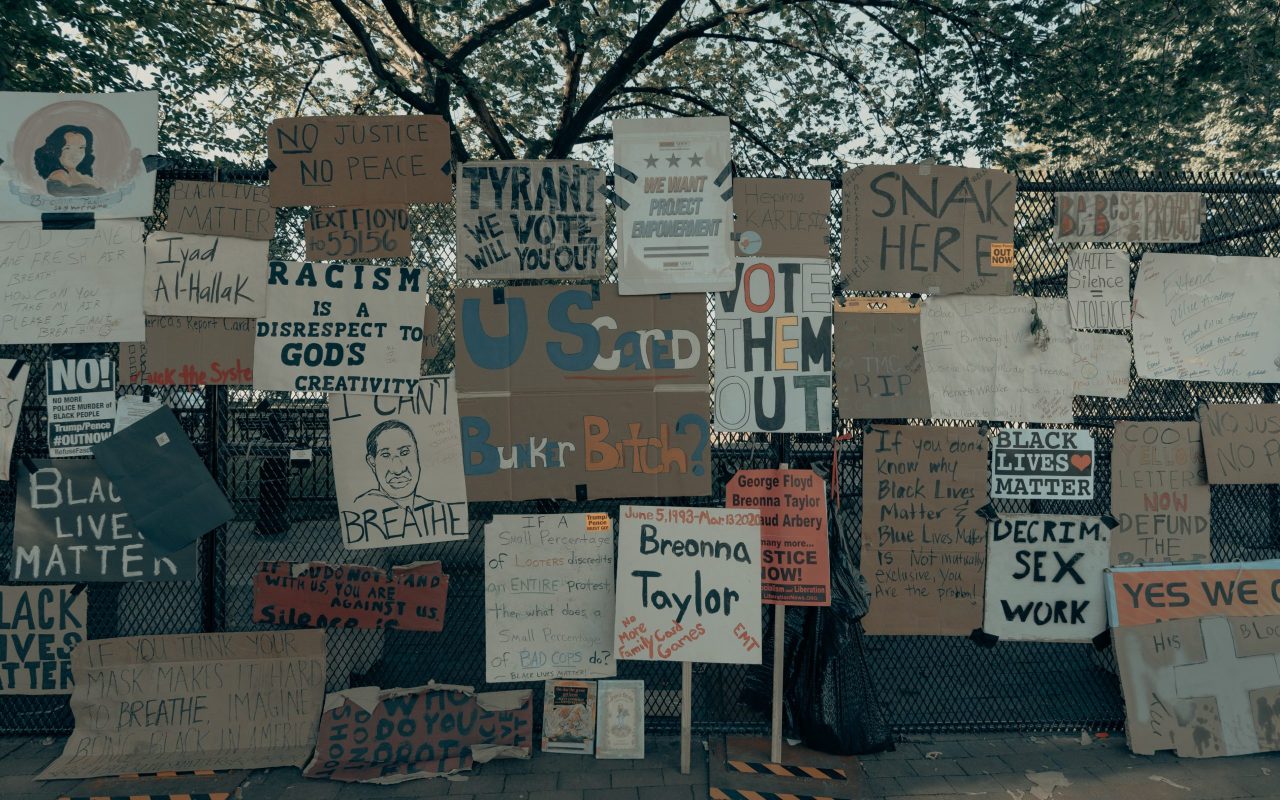interviews
During the Black Lives Matter Movement, A Korean American Mother and Son Spar Over Political Activism
Ryan Lee Wong on cross-racial solidarity and facing intergenerational trauma in his novel "Which Side Are You On?"

In Which Side Are You On, 21-year-old Reed returns to Los Angeles, his hometown, to call on his ailing grandmother. But once there, he uses the opportunity to finally break the news to his parents: he’s dropping out of Columbia. Why participate in the neoliberal system that perpetuates white supremacy and inequity? He would rather devote his time to the Black Lives Matter movement, organize protests to get justice for Akai Gurley, a Black man, shot at the hands of Peter Liang, an Asian American police officer.
As Asian Americans advocate for Liang’s innocence in the name of community, Reed, who is half Chinese and half Korean, feels an immense responsibility to play his part in redressing the social injustice and bringing the revolution he thinks is around the corner. To that end, he seeks to learn about his mother’s involvement in the Black-Korean Coalition of the 1980s, hoping it would give him fodder to keep the current movement alive and relevant, and to better organize cross racial solidarity into being. But as conversations between him and his parents ensue, Reed learns the harsh reality of activism and organizing in practice.
Using electric dialogue, Wong gives the narrative its forward momentum, and expands its scope across time and generations by raising questions of morality and social responsibility in the face of injustice and privilege and by examining historical moments that speak to the importance of cross-racial solidarity.
Ryan Lee Wong was born and raised in Los Angeles—a fact visible in his debut which paints the city with intimate strokes. Wong dedicated two years to living a Buddhist monastic life at the Ancestral Heart Zen Temple. Currently, he lives in Brooklyn where he’s the Administrative Director of Brooklyn Zen Center.
We spoke over Zoom on a Thursday afternoon about the role of social media in activism and organizing movements, empathy as an avenue for understanding, holding space for intergenerational trauma and much more.
Bareerah Ghani: I find it interesting that Twitter comes up a lot in the novel as a source of “woke” news. The book also insinuates the idea of Twitter as an avenue to assert moral superiority and perhaps a proxy for taking actual action against social justice issues. What is your view on the role of social media, in particular Twitter, in opening dialogue on social justice issues and fostering a community?
Ryan Lee Wong: Just like you said, I think Twitter can be both. On one hand, when I was becoming radicalized in my politics, Twitter was a really quick and illuminating way to build up my critical vocabulary. I could log up to Twitter when something happened in the news, and I would get maybe a dozen really smart and interesting takes on something that were often left of what, you know, The New York Times would say about something or other mainstream media outlets, and that felt true to me, on an intuitive level. I thought that was really powerful, and so helpful for me. At the same time, this other thing could happen where I’d be reading those dozen takes, and sometimes they would disagree with each other, and then there would be takes on the takes, and I found it tended towards anxiety and critique; those were the tweets that did the best, those were the kinds of accounts that often got the most followers. And if you are in a world that pushes you towards anxiety and critique it’s actually very hard, I think, to have certain kinds of conversations in which you build relationships and a shared sense of belonging. I didn’t really find that kind of sustained community building on Twitter. I think some people are maybe better at thriving in that kind of environment than I was.
BG: Yeah, my experience with social media is kind of similar—perhaps why the book really spoke to me in how it critiques social media. Even when Reed talks about The Black Lives Matter movement, he says how the movement gained impetus, and essentially made being “radical” “cool”. I thought it was really profound. It got me thinking about this bandwagon effect we now often see after big tragedies such as in the aftermath of George Floyd’s death, everyone on Instagram began posting a black square on their timeline without realizing its significance or reflecting on their own credibility to partake in that action. I was wondering how you view the role of social media platforms and their rapid use in propelling liberal ideologies for social currency.
It actually takes a lot of sustained intimate dialogue to tell the difference between politics and performance; your actions in the world from what you post.
RLW: It’s a double-edged sword. I think that Reed is going through all this way before 2020 and had he been around then, he would’ve been very critical of juice bars posting Black Lives Matter signs in the windows without any kind of progress or social engagement. But then again, Black Lives Matter as a movement is hard to picture at all without social media so you cannot discount the importance of it, and the way that people were able to language and name an experience that was happening nationally and incidents in the country that previously had been seen as isolated incidents of police violence. At the same time, it gets very tricky once influence and celebrity culture get mixed in and there can often be a very facile engagement with politics that’s more about performance. At one point, Reed even says, for our generation it’s really hard to tell performance from your politics and being able to know the difference. And I think that’s one of the challenges of today—it actually takes a lot of sustained intimate dialogue to tell the difference between politics and performance; your actions in the world from what you post.
BG: I’m fascinated by how wide the scope of the narrative is because of its inspection of intergenerational differences. One instance that stood out to me is when Reed points out his mom’s inappropriate use of African American Vernacular English (AAVE), and she goes like, but that’s just how we talked, using AAVE terms was a display of endearment. And Reed says he understands but he could never take his mom’s case to Twitter for “fear of getting dragged.” What are your thoughts on this generational shift on how cross racial solidarity is envisioned now as a celebration of the differences between us, where previously it was about sharing language and culture? Could you speak to this in connection to the role of social media, cancel culture and cultural appropriation.
RLW: One thing that’s really interesting is how, what used to be coalition or solidarity building that happens on a very local, intimate, and geographically specific scale can now be transmitted out globally, almost instantaneously. So when Reed and his mother are having this dialogue about appropriation of Black language and African American vernacular, it’s a question of generational difference and social media, but to me it’s also a difference of geography, time, context and particular movements. So to be politicized in Oakland East Bay in the1970s and five, ten years after the Third World Liberation strikes at Berkeley and SF state, that’s a very different world than Brooklyn with social media in 2016, discussing Akai Gurley, Peter Liang. And it’s also a different world than LA 1980s, South Central and Black-Korean relations there. And so, I think it’s tempting to try to make broad statements about when it is and isn’t appropriate to share and borrow culture. But to me, the only way it’s actually been a constructive and interesting dialogue is when it’s focused in a very specific time, place and context. And so, to take those three moments, my impression is that, in the late ’60s, mid ’70s in the East Bay, there was a much freer sharing of those ideas and cultures—the Black Panthers were being influenced by Maoism, and then were in turn influencing Asian American activists whereas in my experience of Brooklyn in the mid 2010s, there was a lot more care and interest in making sure that non-Black protesters weren’t appropriating or misusing Black language and that also came out of a very real need, which is to think critically about when certain phrases or slogans developed by the Black community are not actually appropriate for non-Black people to use. So it’s all about context.
BG: For me, the heart of the novel lies in how it presents empathy as an avenue to understand one’s community. We see this in Reed’s mom and her being able to be there for her mother while holding space for the difficult emotions attached to that relationship. She teaches Reed to do the same; to understand his grandparents’ greed for money—something he detested—through empathizing with them and trying to feel the pain that led them to worship money. Could you speak to this idea of empathy as a powerful tool to heal and bridge gaps, in connection to your experience at the Ancestral Heart Zen Temple and the lessons you learnt there, in meditation, and community.
RLW: So you could actually describe the entire movement of the novel as going from the head to the heart. So Reed’s big lesson is that in the beginning of the novel, he’s very cerebral. He’s very intellectual, good at applying theories. He’s kind of like a walking theory dispenser—whatever is happening, he has something to name it in a framework. And what he realizes is that it’s not something that’s going to get him far if his true goal is to build sustained community and movements. He has all these contradictions in his head, and he can’t really reconcile certain aspects of what’s going on, and the only space that can actually hold those differences is the heart. Because the heart does not have to divide the world into binaries, the heart’s more capacious and the heart’s a better listener. That is one of the big things that Zen practice has taught me.
Of course you would want to try to alleviate all of the pain that we see and of course believing one could do that will absolutely lead to burn out.
The big misunderstanding around Zen Buddhism is that you sit there and kind of wipe your mind blank. But that’s not my experience at all. So much of Zen practice is actually sitting there in meditation and communal practice for long enough that your bodily wisdom actually starts to come forth. So it’s the opposite of what most people think where it comes from your head down. But actually, the wisdom and the grounding moves from the body up.
One of the big turns that happened for me was a very similar thing to what Reed experiences. I had all these ideas about how the world should be. The more I was able to drop those ideas for long enough to meet things with the heart first, the more I was actually able to feel more profound relationships with people, more compassion for myself and for others and more acceptance of the world as it is. And it’s not a passive acceptance as in oh, that’s just how things are. It’s an acceptance as the first step before trying to go out and change things; an acceptance of reality. The mind thinks it knows what’s going on but actually, I think it often has a hard time accepting reality.
BG: Do you think this acceptance of reality by listening to your heart helps in mitigating the burnout and emotional burdens we see Reed facing, as person of color striving to push against the white supremacist establishment?
RLW: Yeah, absolutely. One of the signs of burnout in my understanding is despair or nihilism. To me, Reed is very much on the cusp of that, if not already there. I think we as humans are not built to directly address all of the suffering in the world at the same time, even though I think for those of us who care and are paying attention that desire can arise, and that’s actually a very lovely, wholesome desire—of course you would want to try to alleviate all of the pain that we see and of course believing one could do that will absolutely lead to burn out. Self care is kind of the buzz word or popular phrase for this but actually what Reed starts to realize is it’s not about self-care in the sense that, I’m so important. It’s that you have to care for this body as an extension of a longer lineage. So part of what he understands over the course of the book is that he’s not just caring for him as this important person or not, he’s caring for an entire history that survived so that he could be there. And that helps to take away the egoism, the narcissism that can arise in certain self care circles. Once you start to understand the ancestry and the longer arc of yourself in history, that’s actually what you’re caring for.
BG: The novel also critiques the neoliberal order that we have, especially the college system that fits into and perpetuates that order by maintaining inequity and upholding white supremacy. We see Reed wanting to drop out of Columbia and his parents trying to convince him not to, even though they went through the same route. In this we see this precarious tug of war between Reed having to be practical or pursuing what he believes in. How do you consider the two in the face of wanting to change the world?
RLW: You know, I joked with my MFA Thesis adviser who read an early draft of this, that it almost seems like there’s something primarily human or evolutionary about being 18 to 22 and needing to burn things down, to do things completely differently. That’s why I think student movements have been so critical throughout history because they’re just willing to discard everything. At the same time, hopefully, those students grow up and realize it’s not necessarily the way to move the world for the rest of your life.
I think again and again what Reed’s parents are saying is not necessarily that he’s wrong, and not that this private university isn’t an institution that perpetuates inequality. They’re just saying that in order to actually change that fundamentally, it’s better to have the tools he will gain from staying. And you know, maybe this isn’t actually true of everyone in every context. But again, given where Reed comes from in terms of history, family and lineage, that is what makes sense for him. It was definitely the right way for some students in 1968, to take over university buildings, walk out and shut down campuses—that was really necessary. But that’s not the kind of historical moment Reed lives in. It’s not going to have the effect he thinks it will at the beginning of the novel.
BG: I love how the novel explores the dynamics between the immigrant parent and child. We see a certain kind of austerity alongside expectations held by the immigrant parent– Halmoni disowns Reed’s mother when she drops out of college, CJ’s mother is harsh on her about taking a semester break from Harvard. What are your views on the viability and fairness of such dynamics between the immigrant parent and child where the former considers the latter as an extension of self and thereby, a second chance, or a “do-over” in life?
RLW: As I was writing this novel, one of the really helpful frameworks was this theory of racial melancholia that David L. Eng and Shinhee Han put forth. They’re talking about the Asian American diaspora in particular, but this can be true of any diaspora—there is a perpetual unresolved mourning for the loss of their homeland and that mourning becomes melancholia, becomes kind of like a state. They actually say, unlike Freud, this is not necessarily a pathology, but it’s important to name.
I think one of the most radical things one can do in the first or second, or even third plus generations, is to really attend to and care for that melancholia because without that, we will project our unresolved mourning onto someone else in the next generation. That’s absolutely what’s going on between Halmoni, and Reed’s mother, and Reed and his mother.
Often first-generation immigrants don’t have the resources to do that care work, because they’re just trying to survive, trying to establish material security.
Often first-generation immigrants don’t have the social or financial resources to do that care work, to really start to attend to that mourning, because often they’re just trying to survive, trying to establish material security. So, of course, those feelings of grief and mourning get passed on in the form of needing the next generation to do something that they couldn’t. It’s a lot to hold and grapple with in that relationship. And so, by the end of the novel, what has to happen is that each side has to do its work, essentially—Reeds mother starts to realize some of the ways that she is doing that projection and Reed is more ready to receive the care his mother’s able to offer, and it’s just a small movement but for the purposes of this novel, it’s everything.
BG: To what extent do you think there’s room for shared healing and holding space for each other?
RLW: When talking about intergenerational trauma and historic trauma, the term healing is used a lot but I’m still not sure what that means. When I think about this novel, and when I think about my own personal work in this area, to me, it’s much more about building the capacity to face those traumas, to really be still with them.
At the beginning of the novel, both Reed and his mother are being thrown around by their individual and shared traumas. They’re miscommunicating; can’t quite seem to ground themselves. And over and over again, Reed is forced to see the reality of his situation; his life, history, social context. As soon as he starts to really see that and develop an honest relationship with that, that’s what allows for real dialogue to happen. Similarly, in real life, my parents made a conscious choice not to talk that much about their past when they grew up. In many ways I think that was a wise choice because I don’t think I was actually ready to hear them until relatively recently. I had to have that emotional capacity and once I did, it all kind of clicked into place.
When we talk about starting to do the work of facing intergenerational trauma and opening a conversation, so much of the work to me is actually internal first. One has to be ready to meet those histories, and to be genuinely surprised by whatever that conversation brings, and that is what allows for a true dialogue to happen.









